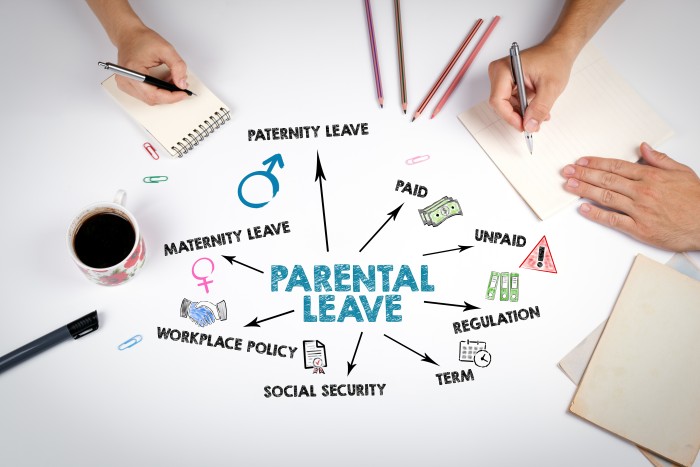
Maternity Rights at Work
Introduction to Maternity Rights: The Basics and Legal Aspects
We’re reviewing an essential topic today, maternity rights at work. They are fundamental to the functioning of a fair and effective workplace. As a UK employer, understanding maternity rights isn’t just an ethical consideration; it’s a legal one. Maternity rights encompass several statutory provisions, including the right to maternity leave, protection against unfair treatment or dismissal and maternity pay.
Here’s the lowdown:
- Right to maternity leave: A pregnant employee can take up to 52 weeks of maternity leave, regardless of how long they’ve worked for you.
- Protection against unfair treatment or dismissal: It’s illegal to treat an employee unfairly or dismiss them due to their pregnancy or maternity leave.
- Maternity pay: Most employees qualify for Statutory Maternity Pay (SMP), paid for up to 39 weeks.
Detailed Breakdown of Statutory Maternity Rights
Let’s look more deeply into each statutory right.
Maternity leave:
The earliest this can start is 11 weeks before the baby’s due date. The employee can decide how much of the available 52 weeks to take, but a minimum of two weeks immediately following the birth is compulsory.
Maternity pay:
- To qualify for SMP, your employee needs to have worked for you continuously for at least 26 weeks continuing into the ‘qualifying week’ which is the 15th week before the expected week of childbirth and earn at least £120 per week.
- SMP pays 90% of the employee’s average weekly earnings for the first 6 weeks, then either £151.97 per week or 90% of their average weekly earnings (whichever is lower) for the next 33 weeks.
Maternity leave entitlement in the UK is a generous provision, one that showcases the importance our society places on supporting new parents. Dismissing or treating an employee unfairly because they’re pregnant or on maternity leave is against the law. The law protects them and must be upheld. The golden rule is to make no decision that negatively impacts an employee on the grounds of their pregnancy or maternity leave.
Managing Maternity Leave: Best Practices for Employers
Handling maternity leave might feel challenging, but with the right approach, you can manage it effectively. Your preparation should start as soon as your employee informs you of their pregnancy. Open communication is crucial; discuss their plans, understand their needs, and clarify your support.
Here are some key steps to take:
- Plan for the absence: Identify who can take over tasks, or if you need temporary staff.
- Regularly communicate: Keep in touch days can be beneficial for both parties.
- Support the return to work: Discuss flexible working options and any potential changes to their role.
Let’s recap:
- Prepare early and communicate openly.
- Support your employee throughout their maternity leave.
- Facilitate a smooth return to work.
By doing this, you show that you value your employees, fostering a supportive and understanding work environment. You’re not just following the law; you’re building a better workplace. And that is something truly worth aiming for.
The Business Impact of Maternity Leave
There are challenges to managing maternity leave correctly. On one side, there’s the immediate impact of an employee’s absence; on the other, there’s the long-term benefit of fostering a supportive work environment.
In the short term, yes, maternity leave can disrupt workflows. When an employee announces their pregnancy, it’s essential to plan for this transition. Whether redistributing tasks among current staff or bringing in temporary workers, having a robust plan will ensure business continuity.
Then, consider the long-term perspective. Supporting maternity leave enhances your brand as a fair and empathetic employer. It helps to build loyalty among your staff, potentially reducing turnover. Furthermore, it can positively influence your company’s reputation, making it a desirable place to work. Remember, an engaged, motivated, and loyal workforce often leads to increased productivity.
Here’s a quick summary:
There may be short-term challenges when a team member goes on maternity leave that require planning and flexibility. Workflow adjustments, for instance. Yet, the long-term benefits can far outweigh these. Research suggests companies that positively support maternity leave have higher employee retention rates and better morale, leading to:
- Improved employee satisfaction and loyalty
- Reduced turnover costs
- Enhanced company reputation
- Increased productivity and motivation
Maternity leave is more than just a legal requirement. It’s an investment in your workforce and business’s future.
Embracing maternity leave in your organisation is more than just compliance with legal requirements. It’s a way of nurturing a supportive and inclusive work culture. So, when it comes to maternity leave, don’t just see it as a disruption. See it as an opportunity to invest in your employees and your business. Trust me, it’s an investment that pays off handsomely in the long run.
Managing Maternity Leave: Best Practices for Employers
When it comes to managing maternity leave, a proactive approach is your best ally. The journey begins as soon as an employee announces her pregnancy. Make this a positive experience by showing support, offering congratulations, and discussing her plans.
Early planning is the cornerstone of smooth maternity rights at work management. Start by identifying the employee’s responsibilities and brainstorming on how to cover these during her absence. Temporary redistribution among current staff or hiring temporary workers are common solutions.
Here are some steps for effective planning:
- Identify key tasks that the employee manages.
- Discuss and agree on a temporary redistribution of tasks.
- Consider hiring temporary staff if needed.
Regular and open communication is vital during your employee’s maternity leave. You have the right to reasonable contact during this period, and there’s something called “Keeping in Touch” days which you can mutually agree to use. These days can help your employee feel connected and ease her transition back to work.
Some tips for maintaining open communication:
- Agree on the frequency and type of contact during maternity leave.
- Use “Keeping in Touch” days if appropriate and mutually agreed.
As her maternity leave draws to an end, start discussing the return-to-work plan. Your employee may have the right to request flexible working arrangements, and as an employer, you have an obligation to consider this seriously.
Points to discuss might include:
- Potential flexible working arrangements.
- Any updates or changes that occurred during her absence.
In a nutshell, managing maternity leave is all about preparation, communication, and support. Show your employees that you care and value them. It fosters a culture of understanding and respect and this can set you apart as an employer. By taking these steps you’re not only supporting your employee but also ensuring the continued success of your business.
Case Studies and Possible Legal Consequences of Neglecting Maternity Rights at Work
If you’re still questioning the importance of maternity rights at work, let’s look at some real-world case studies. You’ll find that neglecting maternity rights can lead to serious legal consequences.
One notable case involved a retailer who faced a substantial financial cost after dismissing an employee who was on maternity leave. The tribunal found the dismissal to be discriminatory, and the employer was ordered to pay compensation for loss of earnings and injury to feelings.
Here are some lessons from this case:
- Never dismiss an employee on maternity leave without substantial reasons unrelated to the leave.
- Ensure a fair process is followed, with proper communication.
In another case, an employer faced legal action for making significant changes to an employee’s role during her maternity leave. The court found the employer guilty of discrimination, and the organisation not only faced financial penalties but also severe damage to their reputation.
Key takeaways:
- Keep communication open and consistent during maternity leave.
- Discuss any significant changes in roles or responsibilities with the employee.
The legal consequences of not adhering to maternity rights can be substantial. Financial penalties can run into thousands of pounds, not to mention the damage to your reputation. And let’s not forget, a discrimination claim can be made at any time during employment and up to three months after the employment ends.
Now, here’s a snapshot of the potential legal consequences:
- Compensation for loss of earnings
- Compensation for injury to feelings
- Damage to the company’s reputation
Understanding and respecting maternity rights isn’t just about avoiding penalties; it’s about fostering a fair and inclusive workplace. Treat your employees with respect and empathy, and you’ll find it reciprocated through their loyalty and dedication. Maternity leave is a crucial period in an employee’s life and as an employer, you have a golden opportunity to show your support. It’s the right thing to do legally, ethically, and for the prosperity of your business.
Conclusion: The Importance of Upholding Maternity Rights at Work
Let’s take a moment to reflect on what we’ve covered. We’ve looked at maternity rights and statutory entitlements, discussed the business impact of maternity leave and explored the best practices for managing it. We’ve also examined real-world case studies, highlighting the legal consequences that can occur when maternity rights are neglected.
The big picture?
- Maternity rights are a legal requirement but they’re also a testament to your values as an employer.
- Managing maternity leave effectively can boost employee loyalty, reduce turnover, and enhance your reputation.
- Neglecting maternity rights can result in substantial legal and financial consequences.
Maternity leave is about more than just compliance. It’s about building a culture that values and supports its employees. By understanding and respecting maternity rights, you’re creating a nurturing environment where employees feel appreciated and motivated to do their best. That’s not just good ethics; it’s good business.
Here are some key actions to take away:
- Understand maternity rights in detail.
- Prepare early for an employee’s maternity leave.
- Keep communication open and consistent throughout.
- Respect your employees’ rights and treat them fairly.
Maternity rights are your employees’ rights. As an employer, upholding these isn’t just about following the rules. It’s about creating a positive work environment where everyone feels valued and respected. That’s the kind of culture that drives businesses forward.
As an expert employment law specialist, I want to stress that understanding maternity rights is essential for every employer. Not only is it the law, but it also reflects on your culture, values, and how you support your team. Remember, the support you show your employees during these critical periods in their lives can have long-lasting effects on their loyalty, motivation, and overall job satisfaction.
With all this knowledge in your arsenal, I believe you are well-equipped to navigate maternity rights effectively and ethically. Let’s take these insights and create better, fairer workplaces. Together, we can make a difference!
Call John Bloor at EBS Law on 01625 87 4400 if you are an employer and need free Employment Law Advice. Maternity Rights


